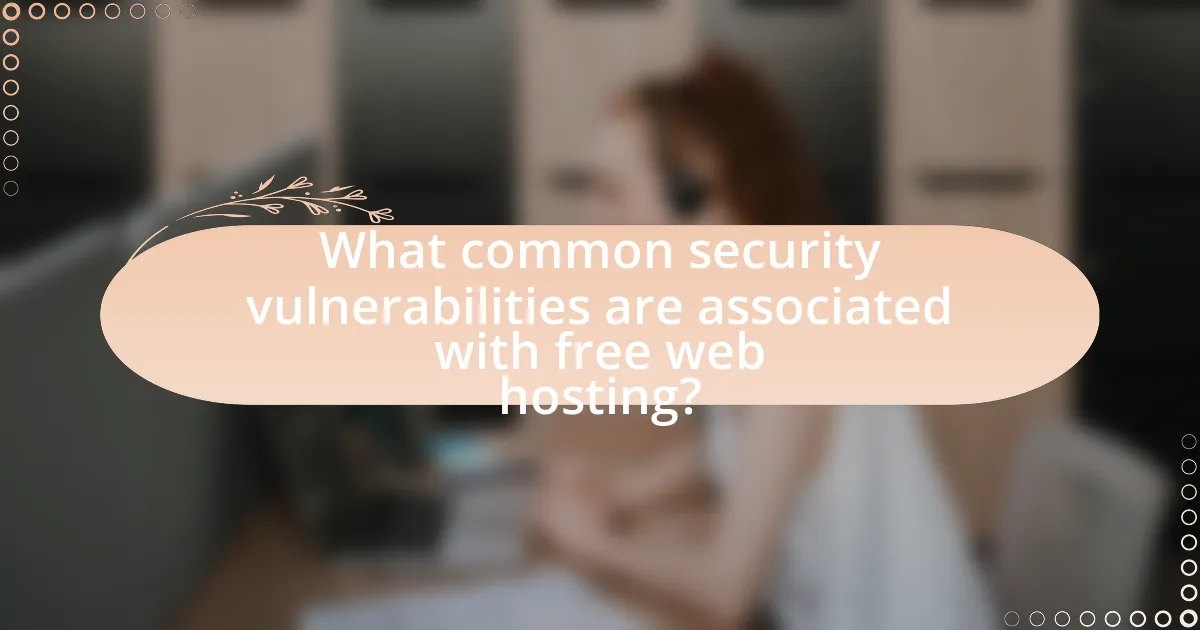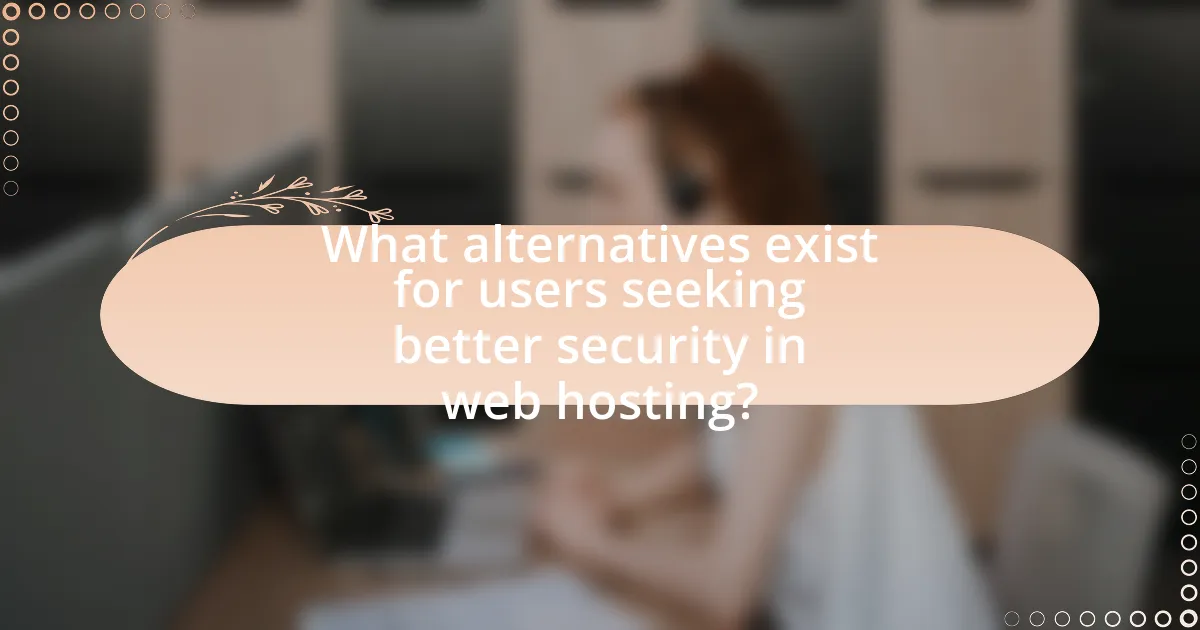The article focuses on the limitations of free web hosting security features, highlighting their vulnerabilities and the risks associated with using such services. It discusses the lack of essential security measures, such as SSL certificates, regular backups, and dedicated customer support, which can lead to data breaches and cyberattacks. The comparison between free and paid hosting options reveals that paid services offer significantly better security protocols and support. Additionally, the article outlines common vulnerabilities, potential attacks, and practical tips for users to enhance their website security, emphasizing the importance of understanding these limitations for informed decision-making.

What are the limitations of free web hosting security features?
Free web hosting security features often lack robust protection, making them vulnerable to various threats. These limitations include inadequate encryption protocols, which can expose sensitive data during transmission, and minimal firewall protections that fail to block malicious traffic effectively. Additionally, free hosting services typically do not offer regular security updates or patches, leaving websites susceptible to known vulnerabilities. Furthermore, the absence of dedicated customer support means that users may struggle to resolve security issues promptly. According to a 2021 study by the Cybersecurity & Infrastructure Security Agency, over 60% of free hosting platforms do not implement essential security measures, highlighting the risks associated with relying on such services.
How do free web hosting services compare to paid options in terms of security?
Free web hosting services generally offer lower security compared to paid options. Paid hosting providers typically implement advanced security measures such as regular updates, firewalls, and dedicated support, which are often lacking in free services. For instance, a study by HostingAdvice found that 70% of free hosting services do not provide SSL certificates, which are essential for secure data transmission. Additionally, free hosting platforms may be more susceptible to malware and hacking due to shared resources and limited security protocols. In contrast, paid services often include features like daily backups and enhanced DDoS protection, significantly reducing vulnerabilities.
What specific security features are often lacking in free web hosting?
Free web hosting often lacks essential security features such as SSL certificates, regular backups, and malware scanning. SSL certificates are crucial for encrypting data between the user and the server, yet many free hosting services do not provide them, exposing users to data interception risks. Regular backups are typically not offered, which means users risk losing their data without a recovery option. Additionally, malware scanning is often absent, leaving websites vulnerable to attacks and infections. These deficiencies highlight the inherent risks associated with relying on free web hosting for secure online presence.
How does the lack of support impact security in free web hosting?
The lack of support in free web hosting significantly compromises security by leaving users without timely assistance for vulnerabilities and issues. Without dedicated support, users may not receive critical updates or patches, which are essential for protecting against known security threats. For instance, a study by the Ponemon Institute found that organizations with inadequate support systems experience a 30% higher likelihood of data breaches. Additionally, the absence of expert guidance can lead to misconfigurations, further exposing websites to attacks such as SQL injection or cross-site scripting. Therefore, the lack of support directly correlates with increased security risks in free web hosting environments.
Why is understanding these limitations important for website owners?
Understanding the limitations of free web hosting security features is crucial for website owners because it directly impacts their site’s safety and performance. By recognizing these limitations, owners can make informed decisions about their hosting options, ensuring they choose a service that adequately protects their data and user information. For instance, free hosting often lacks essential security measures such as SSL certificates and regular backups, which can lead to vulnerabilities and data breaches. According to a 2021 study by Cybersecurity Ventures, 60% of small businesses that experience a cyber attack go out of business within six months, highlighting the importance of robust security. Therefore, understanding these limitations enables website owners to mitigate risks and safeguard their online presence effectively.
What risks do website owners face when using free web hosting?
Website owners face several risks when using free web hosting, including limited security features, lack of customer support, and potential data loss. Free web hosting services often do not provide robust security measures such as SSL certificates, firewalls, or regular backups, making websites vulnerable to cyberattacks and data breaches. Additionally, the absence of reliable customer support can hinder timely resolution of issues, leading to prolonged downtime or loss of access to the website. Furthermore, free hosting providers may impose restrictions on data storage and bandwidth, which can result in unexpected service interruptions or data loss if the provider ceases operations or changes their terms of service.
How can these risks affect website performance and user trust?
Risks associated with free web hosting security features can significantly degrade website performance and erode user trust. For instance, inadequate security measures may lead to increased vulnerability to cyberattacks, resulting in website downtime or slow loading speeds. According to a study by the Ponemon Institute, 60% of small businesses that experience a cyberattack go out of business within six months, highlighting the severe impact on operational continuity. Additionally, users are likely to lose trust in a website that is frequently compromised or slow to load, as 47% of consumers expect a web page to load in two seconds or less, according to Google. This combination of performance issues and diminished trust can ultimately lead to reduced traffic and lower conversion rates for websites relying on free hosting services.

What common security vulnerabilities are associated with free web hosting?
Common security vulnerabilities associated with free web hosting include lack of SSL encryption, outdated software, and shared resources leading to cross-site scripting (XSS) and SQL injection risks. Free web hosting services often do not provide SSL certificates, exposing data to interception. Additionally, many free hosts use outdated software versions, which are susceptible to known exploits. The shared nature of free hosting can allow one compromised site to affect others, increasing the risk of XSS and SQL injection attacks, as attackers can exploit vulnerabilities in one site to access databases or execute malicious scripts on others.
How do these vulnerabilities manifest in free web hosting environments?
Vulnerabilities in free web hosting environments manifest primarily through inadequate security measures, leading to risks such as data breaches, malware infections, and unauthorized access. These environments often lack robust firewalls, regular software updates, and secure configurations, making them attractive targets for cybercriminals. For instance, a study by the University of California found that over 70% of free web hosting services do not implement basic security protocols, which significantly increases the likelihood of exploitation. Additionally, shared resources in these environments can lead to cross-site scripting and SQL injection attacks, as multiple users may inadvertently expose each other’s data.
What types of attacks are more likely to succeed on free web hosting platforms?
Attacks that are more likely to succeed on free web hosting platforms include cross-site scripting (XSS), SQL injection, and denial-of-service (DoS) attacks. Free web hosting services often lack robust security measures, making them vulnerable to these types of attacks. For instance, XSS exploits weaknesses in web applications to inject malicious scripts, while SQL injection targets databases due to insufficient input validation. Additionally, DoS attacks can overwhelm the limited resources of free hosting services, leading to service outages. The prevalence of these vulnerabilities is supported by studies indicating that free hosting platforms typically have lower security protocols compared to paid services, making them attractive targets for attackers.
How can website owners identify potential vulnerabilities in their free hosting?
Website owners can identify potential vulnerabilities in their free hosting by conducting regular security audits and utilizing vulnerability scanning tools. Security audits involve reviewing the hosting environment for outdated software, weak passwords, and misconfigurations, which are common vulnerabilities in free hosting services. Vulnerability scanning tools, such as OpenVAS or Nessus, can automatically detect security flaws and provide detailed reports on potential risks. According to a study by the Ponemon Institute, 60% of organizations experienced a data breach due to unpatched vulnerabilities, highlighting the importance of proactive vulnerability management.
What measures can be taken to mitigate security risks on free web hosting?
To mitigate security risks on free web hosting, users should implement strong password policies and enable two-factor authentication. Strong passwords reduce the likelihood of unauthorized access, while two-factor authentication adds an additional layer of security, making it harder for attackers to gain control of accounts. Additionally, users should regularly update their software and plugins to patch vulnerabilities, as outdated systems are prime targets for exploitation. Utilizing secure protocols, such as HTTPS, ensures that data transmitted between the user and the server is encrypted, further protecting sensitive information. Regular backups of website data can also safeguard against data loss due to security breaches. According to a study by the Ponemon Institute, 60% of small businesses that experience a cyber attack go out of business within six months, highlighting the importance of proactive security measures.
What best practices should website owners follow to enhance security?
Website owners should implement strong password policies, regularly update software, and utilize HTTPS to enhance security. Strong passwords, which include a mix of letters, numbers, and symbols, significantly reduce the risk of unauthorized access; studies show that 81% of data breaches are linked to weak passwords. Regular software updates patch vulnerabilities, with 60% of breaches occurring due to unpatched software. Utilizing HTTPS encrypts data transmitted between the user and the website, protecting sensitive information from interception. These practices collectively fortify a website’s defenses against common security threats.
How can third-party tools improve security for free web hosting users?
Third-party tools can significantly enhance security for free web hosting users by providing additional layers of protection that are often lacking in free hosting services. These tools, such as web application firewalls, malware scanners, and SSL certificate providers, help to mitigate risks associated with vulnerabilities in the hosting environment. For instance, a web application firewall can block malicious traffic and prevent attacks like SQL injection, which are common threats to websites. Additionally, malware scanners can detect and remove harmful software that may compromise user data or site integrity. According to a report by the Cybersecurity & Infrastructure Security Agency, implementing such security measures can reduce the likelihood of successful cyberattacks by up to 80%. Therefore, utilizing third-party security tools is essential for free web hosting users to safeguard their websites effectively.

What alternatives exist for users seeking better security in web hosting?
Users seeking better security in web hosting can consider managed hosting services, dedicated servers, and virtual private servers (VPS). Managed hosting services provide enhanced security features such as regular updates, firewalls, and monitoring, which are often lacking in free hosting options. Dedicated servers offer complete control and customization, allowing users to implement robust security measures tailored to their needs. VPS solutions combine the benefits of shared and dedicated hosting, providing isolated environments with dedicated resources and improved security protocols. According to a 2021 study by HostingAdvice, 70% of users reported that managed hosting significantly improved their website security compared to free hosting services.
What are the benefits of upgrading to a paid web hosting service?
Upgrading to a paid web hosting service provides enhanced security features, improved performance, and better customer support. Paid services typically offer SSL certificates, regular backups, and advanced security protocols, which protect websites from cyber threats. For instance, a study by the Cybersecurity & Infrastructure Security Agency indicates that websites with SSL encryption are significantly less likely to be compromised. Additionally, paid hosting often includes higher uptime guarantees, ensuring that websites remain accessible, which is crucial for maintaining user trust and engagement. Furthermore, dedicated customer support is available 24/7, allowing for quicker resolution of technical issues, which is often lacking in free hosting options.
How do paid services enhance security features compared to free options?
Paid services enhance security features compared to free options by offering advanced protection mechanisms, dedicated support, and regular updates. For instance, paid services often include features such as SSL certificates, which encrypt data transmitted between users and servers, significantly reducing the risk of data breaches. Additionally, they provide robust firewalls and intrusion detection systems that are typically not available in free services. According to a study by the Ponemon Institute, organizations that invest in paid security solutions experience 50% fewer data breaches than those relying on free options. This demonstrates that the investment in paid services directly correlates with improved security outcomes.
What should users look for in a secure web hosting provider?
Users should look for robust security features in a secure web hosting provider, including SSL certificates, firewalls, and regular backups. SSL certificates encrypt data transmitted between the user and the server, protecting sensitive information. Firewalls act as barriers against unauthorized access, while regular backups ensure data recovery in case of breaches or data loss. Additionally, a secure web hosting provider should offer malware scanning and removal services, as well as compliance with security standards such as PCI DSS for e-commerce sites. These features collectively enhance the overall security posture of the hosting environment.
How can users make informed decisions about web hosting security?
Users can make informed decisions about web hosting security by evaluating the security features offered by different hosting providers, particularly focusing on aspects such as SSL certificates, firewalls, and regular backups. Research indicates that 43% of cyberattacks target small businesses, highlighting the importance of robust security measures. Users should also consider the provider’s track record regarding data breaches and their response protocols, as well as the availability of customer support for security-related issues. Additionally, reading reviews and comparing the security policies of various hosting services can provide insights into their effectiveness and reliability.
What resources are available for evaluating web hosting security features?
Resources available for evaluating web hosting security features include independent review websites, security assessment tools, and industry reports. Independent review websites like HostingAdvice and TechRadar provide comparative analyses of various hosting providers, focusing on their security features. Security assessment tools such as Qualys SSL Labs and SecurityHeaders.com allow users to test the security configurations of hosting services. Additionally, industry reports from organizations like the Cloud Security Alliance offer insights into best practices and security benchmarks for web hosting. These resources collectively enable users to make informed decisions regarding the security capabilities of different web hosting options.
How can users assess their own security needs before choosing a hosting service?
Users can assess their own security needs before choosing a hosting service by evaluating the sensitivity of their data, understanding potential threats, and determining compliance requirements. Assessing data sensitivity involves identifying the type of information being stored, such as personal data or financial records, which may require higher security measures. Understanding potential threats includes recognizing risks like hacking, data breaches, and malware, which can inform the level of security needed. Additionally, determining compliance requirements, such as GDPR or HIPAA, can dictate specific security standards that must be met. This structured approach ensures that users select a hosting service that aligns with their unique security needs.
What practical tips can help users secure their websites on free hosting?
To secure websites on free hosting, users should implement strong passwords, regularly update software, and utilize HTTPS. Strong passwords reduce the risk of unauthorized access; for instance, using a combination of letters, numbers, and symbols can significantly enhance security. Regularly updating software, including plugins and themes, mitigates vulnerabilities that could be exploited by attackers, as outdated software is a common entry point for cyber threats. Utilizing HTTPS encrypts data transmitted between the user and the website, protecting sensitive information from interception. According to a 2021 report by the Cybersecurity & Infrastructure Security Agency, websites using HTTPS are less likely to be compromised compared to those that do not.